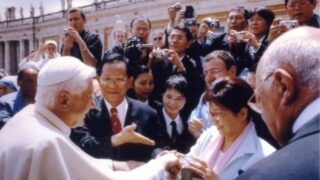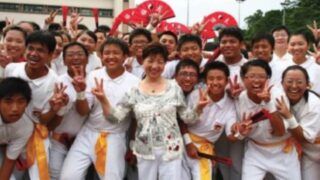The United Nations have established a day for the right to know the truth about human rights violations. The Tai Ji Men case needs truth, too.
by Alessandro Amicarelli


On March 24, 2024, United Nations International Day for the Right to the Truth Concerning Gross Human Rights Violations and for the Dignity of Victims, CESNUR and Human Rights Without Frontiers organized one of their regular webinars on the Tai Ji Men case, with the title “In Solidarity with Tai Ji Men: Defending Victims of Discrimination and Persecution.”
Massimo Introvigne, an Italian sociologist who serves as managing director of CESNUR and editor-in-chief of “Bitter Winter” introduced the webinar. He noted that Greek, Latin, and English languages use three different and unrelated expressions to indicate what is true, respectively “aletheia,” “veritas,” and “truth.” All have roots connected with the ideas of “unveiling” something that is hidden and remaining “rooted” in a loyalty and responsibility that are ultimately spiritual.
Introvigne then discussed the figure of Pontius Pilate, the Roman governor who, although he believed Jesus to be innocent, sentenced him to death for political reasons. When Jesus told him that his mission was to proclaim the truth, Pilate answered “What is truth?” Although some traditions report he later repented, Pilate is remembered in history as a prototype of the corrupt bureaucrats who inflict injustice and justify themselves by arguing that truth is a relative concept and cannot be known for sure. Tai Ji Men and their Shifu (Grand Master), Dr. Hong Tao-Tze, Introvigne said, unfortunately encountered the same kind of corrupt bureaucrats. If a correct notion of truth as universal and binding for everybody is restored, Introvigne concluded, these bureaucrats have no excuses and justice should be granted to Tai Ji Men.
Introvigne then presented the two speakers of the first session, Karolina Maria Kotkowska, researcher on Esotericism and New Religious Movements at Jagiellonian University in Krakow, Poland, and Sara Susana Pozos Bravo, professor at Universidad Sâmann of Jalisco in Guadalajara, Mexico.
Kotkowska presented a victim of Nazi persecution, Janusz Korczak, known in Poland as “the Old Doctor,” who created a pioneer orphanage based on innovative pedagogical ideas. The orphanage, whose pupils were Jewish as Korczak himself was, was raided in 1942 and both the doctor and the children were taken to the Nazi concentration camp of Treblinka, where they all died. Korczak reacted against the authoritarian ways of educating children of his time and proposed a new pedagogy respecting the personality and freedom of the child, which was also based on his Theosophical ideas. Kotkowska compared Korczak to Dr. Hong Tao-Tze. Although Korczak’s fate was more tragic, both he and Dr. Hong were persecuted not only for their religious ideas but because they devoted their life to teaching their pupils and disciples how to think independently, Kotkowska said.


Pozos Bravo devoted her speech to transitional justice and the need to apply it in Taiwan to the Tai Ji Men case. She presented five demands to the government of Taiwan on behalf of the international community of scholars who have studied the Tai Ji Men case. First, transitional justice should be granted to Tai Ji Men overcoming any time limit with respect to when their human rights were abused. Second, the fact that the monetary contributions by disciples to masters of qigong and martial arts are gifts rather than alleged tuition fees should be established officially by appropriate regulations. Third, the State should revoke the illegal tax bill that resulted in the confiscation of the sacred land of Tai Ji Men. Fourth, the State should indemnify Tai Ji Men for the damages they suffered. Fifth, the innocence of Tai Ji Men’s Shifu and dizi (disciples) should be publicly acknowledged and their honor restored.
Between the two speeches of the first session, Introvigne presented a video on the unveiling of a monument commemorating Tai Ji Men’s resilience against tax harassment and persecution at the site of the Swiss Mountain Villa near Taipei. The Villa was bought in 1995 by Dr. Hong and destined to be a large event venue and a learning center for Tai Ji Men, with facilities for hosting overseas dizi when they come to Taiwan. From 1997 to 2020, the property was first frozen then used as a collateral in the fabricated tax case against Tai Ji Men. Only in 2020 was the Swiss Mountain Villa finally returned to Dr. Hong. By then, because of the problems that lasted for so many years, the property was in a sad state of abandonment and remains a testament to the injustice of the Tai Ji Men case.


The second session was introduced by Willy Fautré, co-founder and director of Human Rights Without Frontiers. He first introduced a video on the events in Taiwan honoring the late Madam Yu Mei-Jung, the Shimu of Tai Ji Men, i.e., the wife of Dr. Hong. She supported Dr. Hong in all his initiatives and became herself a well-known leader of the global effort of Tai Ji Men to promote conscience, peace, and love, respected and honored both in Taiwan and internationally.


Fautré called the truth the fuel that is needed to put in motion the train of justice. Without truth there can be neither justice nor human rights. Truth and justice for Tai Ji Men have been asked for almost twenty-eight years in Taiwan and internationally, Fautré said, expressing the hope that by proclaiming the truth on the case justice will also be achieved.
Fautré then presented the testimonies of five Tai Ji Men dizi. Sherry Yang, a retiree who joined Tai Ji Men thirty-one years ago, reminisced about the trips to spread peace, love, and conscience in which she participated with Dr. Hong. She said that her most memorable experience was to be part together with some 1,200 dizi of the Tai Ji Men group at the 1999 Seattle’s Seafair Torchlight Parade, when hundreds of thousands of citizens and tourists cheered them by shouting “I love Taiwan! I love Tai Ji Men!” She was also part in 2000 of Tai Ji Men’s visit to the U.S. Capitol and performance at the Sydney Opera House during the Sydney Olympic Games. She also went through the sad experience of discrimination and tax harassment—and continues after so many years her struggle for justice.


Hyatt Wu, an 11-year-old primary school student, shared his emotions in having been part of the memorial event for Shimu, singing in the chorus. He was also taken by his mother to participate in tax and legal reform demonstrations advocating for a solution of the Tai Ji Men case and a better tax system more respectful of the rights of Taiwan’s taxpayers. Hyatt said that even a primary school student can understand the simple facts of the injustice vested on Tai Ji Men and others in Taiwan, and it is surprising that some bureaucrats and politicians seem not to get them.


Tina Huang, the assistant manager in the Product Licensing Department of a Taiwanese company, is also a veteran Tai Ji Men practitioner, having joined as a child thirty years ago. She was in college when the Tai Ji Men case started in 1996 and her roommate showed her a newspaper telling her “You guys’ Tai Ji Men is a scam.” She started understanding the power of slander and defamation at a time when the Internet was not developed as it is today, and most people would take their information from printed media or television only. Overcoming this campaign of fake news, Huang said, looked like a David versus Goliath fight. After so many years, however, many Taiwanese understand the truth about Tai Ji Men. She hopes that after the January 2024 elections the new government will also make progress towards solving the Tai Ji Men case.


Mochi Li, a data analyst, mentioned the 2022 Taiwan’s “Pathway to Sustainable Governance for Listed and OTC Companies,” under which companies are evaluated for their contribution to sustainable development according to three parameters called ESG: environment, social issues, and transparent governance. Li experienced first-hand that the ESG project is beneficial for Taiwanese companies and their image internationally. However, she finds paradoxical that ESG, which mentions human rights among the social issues included in the evaluation, is applied to private companies in Taiwan but not to the National Taxation Bureau, which consistently violated the rights of Tai Ji Men and other taxpayers.


Thomas Jan, a structural consultant and former university associate professor, has been practicing Qigong with Tai Ji Men since 1995. He asked the question whether the public protests of Tai Ji Men achieved some results. He believes they did, as they discouraged corrupt bureaucrats from further violating the laws, although past injustices such as the one affecting Tai Ji Men have not been rectified. Tai Ji Men dizi have demonstrate great patience, Jan said, and they will continue to protest hoping to awaken the conscience of the officials.


Marco Respinti, an Italian scholar and journalist who serves as director-in-charge of “Bitter Winter,” offered the conclusions of the webinar, focusing on the worst damage inflicted on victims of human rights violations: dehumanization. It amounts to denying them what makes them what they are—human beings. The right to truth, Respinti said, has three dimensions. First, it is a right to know the truth on important facts, including abuses of human rights by the authorities. Second, it is a right to be treated with respect and truth, i.e., not to be slandered and defamed. Third, it is the right to pursue freely the ultimate truth, spiritual or religious, i.e., to enjoy freedom of religion or belief. All these rights were denied to Tai Ji Men, Respinti noted. It is only by reiterating that the right to truth is inalienable, indivisible, and non-negotiable that the Tai Ji Men case can be solved, Respinti insisted.
The event concluded with a final video, a trailer for a concert honoring the memory of Shimu, Madam Yu Mei-Jung, to be held at Luckman Fine Arts Complex at California State University in Los Angeles on April 7, 2024.










